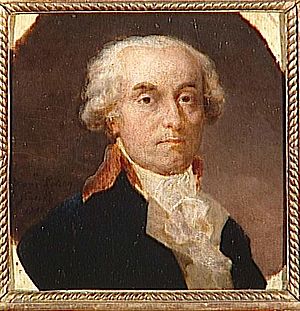Jérôme Pétion de Villeneuve facts for kids
Quick facts for kids
Jérôme Pétion de Villeneuve
|
|
|---|---|

Portrait by Jean-Urbain Guérin
|
|
| 1st President of the National Convention | |
| In office 20 September 1792 – 4 October 1792 |
|
| Preceded by | Louis XVI (King of France) |
| Succeeded by | Jean-François Delacroix |
| 2nd Mayor of Paris | |
| In office 18 November 1791 – 15 October 1792 |
|
| Preceded by | Jean Sylvain Bailly |
| Succeeded by | Philibert Borie (temporary mayor) |
| Personal details | |
| Born | 3 January 1756 Chartres, Eure-et-Loir, France |
| Died | 24 June 1794 (aged 38) Saint-Magne-de-Castillon, near Saint-Émilion, Gironde, France |
| Political party | Girondist |
| Occupation | Writer, politician |
| Signature |  |
Jérôme Pétion de Villeneuve (born January 3, 1756 – died June 24, 1794) was a French writer and politician. He is best known for serving as the second mayor of Paris from 1791 to 1792. He played an important role during the French Revolution.
Contents
Early Life and Political Beginnings
Jérôme Pétion de Villeneuve was born in Chartres, France. His father was a prosecutor, which is a type of lawyer who works for the government. Pétion himself became a lawyer in 1778. Before the French Revolution, not much was known about him.
He started to write and share his ideas. He wrote about important topics like marriage and civil laws. He also spoke out against old traditions from the Ancien Régime (the old system of government in France). For example, he disliked primogeniture, which was a rule where the oldest son inherited everything. Pétion believed this rule caused unfairness.
Joining the Revolution
In 1789, Pétion was chosen as a representative for Chartres. He joined the Estates-General, which was a meeting of different groups in French society. Later, he became part of the Constituent Assembly. In both groups, Pétion was known as a strong supporter of change.
He worked closely with other important figures of the Revolution. He supported Honoré Mirabeau and spoke against the queen. In December 1790, he was elected president of the Assembly. He also became president of the criminal court in Paris in 1791.
When Louis XVI (the King of France) tried to escape Paris in June 1791, Pétion was one of the three people chosen to bring him back. After the Constituent Assembly finished its work, Pétion and Maximilien Robespierre were seen as heroes by the people of Paris.
Mayor of Paris
In late 1791, the mayor of Paris, Jean-Sylvain Bailly, resigned. This was because a powerful political group called the Jacobins was gaining control. Pétion was very popular in Paris. On November 16, 1791, he was elected as the new mayor of Paris. He won against Lafayette, another famous figure.
Challenges as Mayor
As mayor, Pétion showed his strong belief in a republic, meaning a country without a king. He was not a fan of the old monarchy. On June 20, 1792, he allowed a large crowd to enter the Tuileries Palace. This was where the royal family lived. The crowd insulted the king and his family.
Because he did not protect the palace, Pétion was temporarily removed from his job on July 6. However, the leaders of the Legislative Assembly (the new government body) supported him. They quickly put him back in office on July 13.
On August 4, Pétion, as the head of the Paris government, demanded that the king be removed from power. Soon after, there was news of an invading army and a battle. This caused great fear in Paris. This fear led to events known as the September Massacres. During this time, angry crowds targeted prisoners and people thought to support the king.
Convention, Flight, and Death
Pétion was later elected to the National Convention, which was the new governing body of France. He became its first president. After this, he stepped down as Mayor of Paris.
Inside the Convention, there were many disagreements between different political groups. Pétion was part of the Girondin party. This group was more moderate. Their opponents were the Montagnards, who were more radical. Pétion voted for the king's death and for allowing the people to have a say in the king's fate.
He also helped create a new plan for the French Constitution. Pétion became part of the Committee of General Defense in March 1793. This committee was a very important group that later became the Committee of Public Safety. He spoke out against Robespierre, who had accused him of hiding information about a plan to bring back the old French government.
Escape and End
On June 2, 1793, Pétion was named as one of twenty-two Girondin leaders who were to be arrested. He managed to escape Paris and went to Caen. There, he tried to start a rebellion against the Convention. When that failed, he fled with other Girondin leaders to the Gironde region. They were hidden by a wigmaker in Saint Emilion.
About a month before Robespierre himself lost power, Pétion and his friends felt they were no longer safe. Some of his companions were arrested and died. Pétion and another leader named François Nicolas Leonard Buzot were found dead in a field on June 27, 1794.
See also
 In Spanish: Jérôme Pétion de Villeneuve para niños
In Spanish: Jérôme Pétion de Villeneuve para niños

